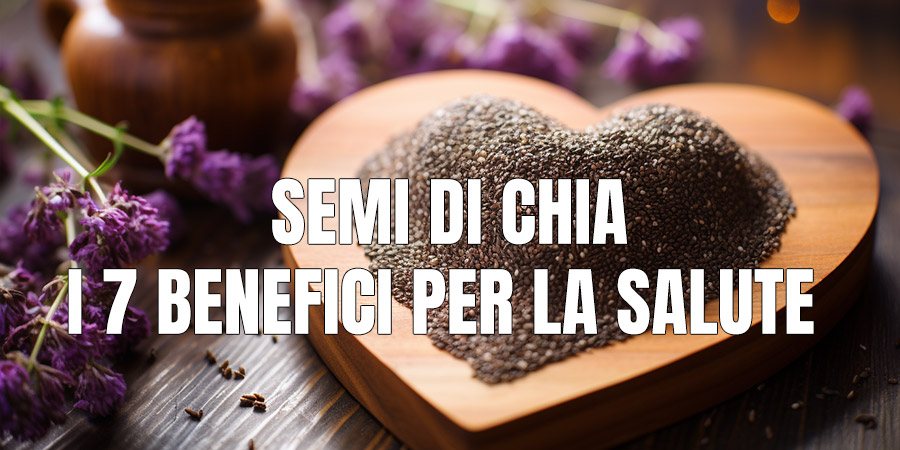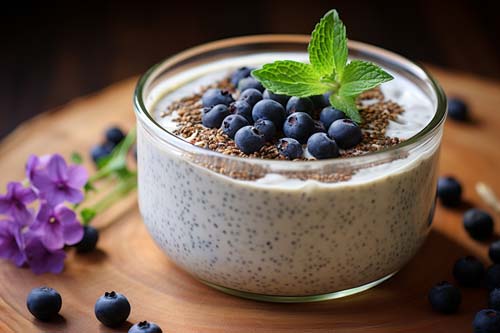Chia seeds The 7 health benefits

Chia seeds contain antioxidants, minerals, fiber and omega-3 fatty acids. These nutrients play a role in supporting multiple functions and systems of the body
Chia seeds may be small, but they are incredibly packed with nutrients. A staple in ancient Aztec and Mayan diets, these seeds have been touted for their health benefits for centuries. The nutrients in chia seeds can support heart health, support strong bones and improve blood sugar management. Additionally, chia seeds are versatile and can be used in many recipes.
Here are the 7 health benefits of chia seeds:
1. Highly nutritious
Chia seeds are tiny white or black seeds of the Salvia hispanica L plant. They are believed to be native to Central America. Historically, the Aztec and Mayan civilizations used the seeds in their diet as well as for medicinal, religious ritual and cosmetic purposes. Today, people all over the world appreciate chia seeds. Ancient civilizations considered chia seeds to be highly nutritious, a belief supported by modern science. In fact, just 28 grams (2 tablespoons) of chia seeds contains:
calories: 138
proteins: 4,7 grams
fat: 8,7 grams
alpha-linolenic acid (ALA): 5 grams
carbohydrates: 11,9 grams
fiber: 9,8 grams
calcium: 14% of the daily value (DV)
iron: 12% of the DV
magnesium: 23% of the DV
phosphorus: 20% of the DV
zinc: 12% of the DV
vitamin B1 (thiamine): 15% of the DV
vitamin B3 (niacin): 16% of the DV
This nutritional profile is especially impressive considering that this is a single serving size of approximately two tablespoons.
2. Rich in antioxidants
Chia seeds are also an excellent source of antioxidants. Antioxidants not only protect the sensitive fats in chia seeds from going rancid, but they also benefit human health by neutralizing reactive molecules known as free radicals, which can damage cellular compounds if they accumulate in the body.
For example, free radical damage contributes to aging and diseases such as cancer. Specific antioxidants found in chia seeds include chlorogenic acid, caffeic acid, myricetin, quercetin, and kaempferol. All of these may have protective effects on the heart and liver, as well as anti-tumor properties.
For example, chlorogenic acid can help lower blood pressure, while caffeic acid has anti-inflammatory effects.
3. It can promote weight loss
The fiber and protein in chia seeds can be beneficial to those trying to lose weight. 28 grams of chia seeds contains nearly 10 grams of dietary fiber. This means they contain a whopping 35% fiber by weight. Although research on this topic is mixed, some studies suggest that fiber consumption may play a role in preventing overweight and obesity.
Additionally, the protein in chia seeds might help reduce appetite and food intake.
A study of 24 participants found that eating 7 grams or 14 grams of chia seeds mixed with yogurt for breakfast increased feelings of satiety and reduced short-term food intake compared to consuming yogurt without chia.
In contrast, a 6-month study involving 77 people with overweight or obesity and type 2 diabetes who were following a low-calorie diet found that those who took chia seeds daily experienced significantly greater weight loss than those who had received a placebo.
4. May reduce the risk of heart disease
Since chia seeds are rich in fiber and omega-3s, consuming them can reduce the risk of heart disease. Soluble fiber, found primarily in chia seeds, can help reduce total and LDL (bad) cholesterol in the blood. In turn, this can reduce the risk of heart disease. Consuming ALA, the omega-3 fatty acid found in chia seeds, has also been linked to a decreased risk of heart disease.
Some human studies have found that chia seed supplements significantly reduce blood pressure in people with hypertension, which is a strong risk factor for heart disease.
Overall, chia seeds may benefit heart health, but more research is needed.
5. They contain many important nutrients for bones
Chia seeds are rich in numerous nutrients important for bone health, including:
- soccer
- phosphorus
- magnesium
Many studies suggest that getting enough of these nutrients is important for maintaining good bone mineral density, an indicator of bone strength. Additionally, the ALA in chia seeds may play a role in bone health. Observational studies have found that consuming this nutrient may also be associated with increased bone mineral density.
Eating chia seeds regularly can help keep your bones strong.
6. It can reduce blood sugar levels
Consuming chia seeds may help regulate blood sugar, likely due to their fiber content and other beneficial compounds. People with diabetes may experience high blood sugar levels. Consistently high fasting blood sugar levels are associated with an increased risk of several complications, including heart disease.
Notably, older research from 2010 and 2013 suggests that eating bread containing chia seeds helps reduce post-meal rises in blood sugar among healthy adults, compared to eating bread without chia seeds.
However, more research is needed to learn more about the connection between these nutritious seeds and blood sugar regulation.
7. Easy to incorporate into your diet
Chia seeds are incredibly easy to incorporate into your diet. You can add them to just about anything. There's no need to grind, cook, or otherwise prepare them, making them a convenient addition to recipes.
They can be eaten raw, soaked in juice, or added to oatmeal, puddings, smoothies, and baked goods. You can also sprinkle them on top of cereals, yogurt, vegetables or rice dishes. Plus, they work wonders in homemade pancakes as a binder.
Given their ability to absorb water and fat, you can use them to thicken sauces and as an egg substitute. They can also be mixed with water and made into a gel.
The seeds appear to be well tolerated. However, if you are not used to eating a lot of fiber, you may experience digestive side effects such as bloating or diarrhea if you eat too many seeds in one sitting. A common dosage recommendation is 20 grams or about 1,5 tablespoons of chia seeds twice daily. Remember to drink plenty of water to prevent any digestive side effects. Chia seeds are not only rich in minerals, omega-3 fats, antioxidants and fiber, but they are also easy to prepare.
Studies suggest they have various health benefits, ranging from weight loss to a reduced risk of heart disease. However, more research involving humans is needed before firm conclusions can be drawn.
If you want to reap the possible benefits of chia seeds, consider incorporating them into your diet. They're a great addition to smoothies, oatmeal, yogurt, baked goods, and more.
Try it today: If you've never had yogurt with chia seeds, it's time to try it!

Chia seeds and yogurt make a delicious and nutritious combination. This recipe is very simple to prepare and can be customized to your tastes with various seasonings and flavourings. Here's a basic recipe to get you started:
Ingredients:
1/4 cup chia seeds
1 cup Greek yogurt (or any yogurt of your choice)
1 cup milk (dairy or non-dairy, such as almond milk or coconut milk)
1-2 tablespoons honey or maple syrup (adjust to taste)
Fresh fruit (e.g. berries, sliced bananas, mango or kiwi) for garnish
Nuts (e.g. almonds, walnuts or pecans) for garnish
Additional sweetener (honey, maple syrup, or agave) for drizzling (optional)
Instructions:
Mix chia seeds: In a bowl, combine the chia seeds, yogurt, milk, honey or maple syrup, and vanilla extract (if using). Mix everything until well combined.
Let rest: Cover the bowl with plastic wrap or a lid and refrigerate for at least 2 hours or overnight. During this time, the chia seeds will absorb the liquid and create a thick, pudding-like consistency.
Mix and serve: after the mixture has thickened, mix well to break up any lumps and distribute the chia seeds evenly. Taste and, if necessary, adjust the sweetness by adding more honey or maple syrup.
Finish and Enjoy: Serve your Yogurt Chia Seed Pudding in individual bowls or glasses. Top it off with fresh fruit and nuts of your choice. If you like, you can also add a little more honey, maple syrup or agave for added sweetness.
Variations: Get creative with your toppings and flavorings. You can add cinnamon, cocoa powder, nut butter, or a sprinkle of granola to add texture and flavor.
This chia seed and yogurt pudding is perfect for a healthy breakfast, snack or dessert. It's packed with protein, fiber and omega-3 fatty acids from chia seeds, and the yogurt adds a creamy, tangy element. Plus, you can customize it with your own fruits and nuts.
Sources:
https://www.ncbi.nlm.nih.gov/p...
https://www.ncbi.nlm.nih.gov/p...
https://www.ncbi.nlm.nih.gov/p...
https://fdc.nal.usda.gov/fdc-a...
https://www.ncbi.nlm.nih.gov/p...
https://www.ncbi.nlm.nih.gov/p...
https://pubmed.ncbi.nlm.nih.go...
https://pubmed.ncbi.nlm.nih.go...
https://pubmed.ncbi.nlm.nih.go...
https://pubmed.ncbi.nlm.nih.go...
https://www.ncbi.nlm.nih.gov/p...
https://www.researchgate.net/p...
https://www.ncbi.nlm.nih.gov/p...
https://pubmed.ncbi.nlm.nih.go...
https://www.ncbi.nlm.nih.gov/p...
https://www.ncbi.nlm.nih.gov/p...
https://www.healthline.com/nut...
https://pubmed.ncbi.nlm.nih.go...
https://www.ncbi.nlm.nih.gov/p...
https://pubmed.ncbi.nlm.nih.go...
https://www.healthline.com/hea...
https://pubmed.ncbi.nlm.nih.go...
https://www.ncbi.nlm.nih.gov/p...
https://pubmed.ncbi.nlm.nih.go...
https://pubmed.ncbi.nlm.nih.go...
https://www.ncbi.nlm.nih.gov/p...
https://www.ncbi.nlm.nih.gov/p...
https://www.healthline.com/nut...
No messages found
Write a review